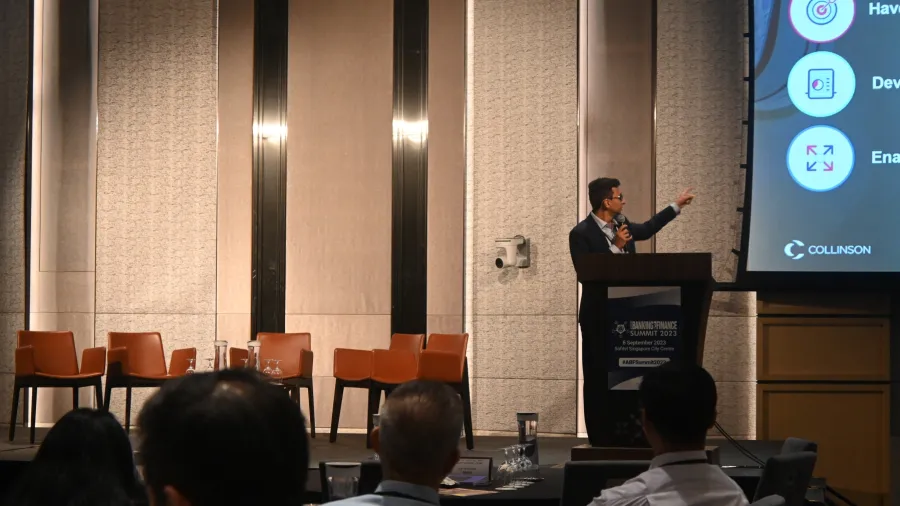
Tech and transformation take center stage at the ABF Summit 2023
Over 180 participants graced the 20+ sessions in the day-long event.
There’s a new technological tool shaking up the financial services industry: generative artificial intelligence. Far from being a fad, it’s expected to shape financial services in the future, and the choice is not in adapting or not– but how far behind you wish to be when the future kicks in.
“With my many conversations with senior FS executives, we’ve all agreed that the facts are increasingly pointing towards the conclusion that generative AI will grow beyond an interesting topic for dinner conversations, into something that is here to stay,” Rafael Lam, a partner of Bain & Company told attendees of the 2023 edition of the Asian Banking & Finance Summit, held at Sofitel Singapore City Centre, 6 September.
A total of 180 participants attended the full-day event, which included speaking sessions, speeches and panel discussions highlighting the three core topics echoing across the banking industry: technology, transformation, and brand marketing.
Unlike traditional AI, which is pre-programmed to solve or do a limited task, generative AI– as the name suggests – generates new and original content from vast data inputs. Relationship managers (RMs), for example, can use generative AI to quickly find and tailor the right information for every client. One bank, Morgan Stanley, is already building an AI assistant that combines search and content creation capabilities to do exactly that, Lam said.
As for adopting generative AI, Lam advised FIs to “go fast and slow,” kicking off micro experiments and speed boats for highly valuable use cases.
“At the same time, they also launch workstreams to address longer-term questions such as ethics, data privacy, or return on investment,” Lam added, noting that organisations should avoid the traditional project top-down approach of planning the entire transformation before kicking-off experimentation.
DBS managing director and group head of consumer banking, Sanjoy Sen, sat down with ABF editor-in-chief Tim Charlton to discuss digital transformation in the current financial landscape– particularly that of DBS. (READ MORE: DBS's Sanjoy Sen explores digital currency, future M&A opportunities)
Sen highlighted three areas that DBS in particular has made significant investments on: blockchain, digital currencies, and the metaverse, all of which DBS is actively partaking in either through new exchanges or through joining government initiatives. He also discussed DBS’ acquisition strategy, on the heels of its recently finished integration of Citi consumer assets.
As for where DBS is looking to acquire businesses next, Sen said that the next opportunity will likely come from the financial technology sector. “Many of these players are looking to get acquired,” he said.
Opportunities abound as travel rebounds
Rohan Bhalla, Vice President for Business Solutions in APAC for Collinson, noted the influence of offering travel-related rewards and benefits to encourage brand loyalty and engagement amongst customers.
Bhalla cited a 2023 APAC consumer insights study conducted by Collinson, which found that 4 in 5 customers indicated that the experience a brand provides is as important as its products and services. For banks, it may do them well to consider offering better travel rewards: 7 in 10 (76%) of bank programme members say that they chose this bank because they made available travel-related rewards.
“The battleground for travel rewards is not new. It's highly contested. It's a space that all financial institutions with their card programs are working in. But the opportunity really is, how do we innovate in this space, so that the value that travel creates for consumers, gets translated into measurable business impact for the banks,” Bhalla said.
ALSO READ: APAC leads globally in terms of cashless transactions – Survey
Transformation is a journey, not an end goal
EY partner and Asean banking and capital markets leader Seah Li Yun led a panel discussion on how banks in APAC can achieve their transformation goals, which aimed to answer how organisations should rethink their transformation goals and create a culture of continuous transformation and how they plan to place customers at the heart of the transformation.
OCBC’s head of group transformation, Lee Guan Liu; HSBC senior vice president & regional lead for global payments solutions, Abhishek Kapoor; and Dennis Ng, Standard Chartered’s executive director and head of group transformation strategy, all agreed that in setting transformation goals, there is a need to curate a culture of continuous transformation within the organisation.
It is not a matter of undergoing digital transformation for digitisation’s sake, but rather, it is to achieve a specific goal, notes Standard Chartered’s Ng.
“Our organization said we don't just define digital transformation as digital reforming. The digital is a means to an end, it's a way to achieve a certain outcome. The transition is a journey,” Ng told attendees.
EY Partner Neena Antal followed the panel with a speaking session on one of the aspects often cited as an end-goal by organizations as to why they undergo transformation: personalisation.
Customers want more personalized experiences but are often frustrated with the current personalisation offered by their financial services provider, Antal said, citing EY’s consumer banking survey. This arises from a gap in what was offered: clients want content, communication, recommendations, and offers that are tailored to their tastes. Instead, banks offer generic marketing, or reach out with offers that don’t recognise their prior business relationship.
ALSO READ: Data is the bane and boon of addressing sustainable investment gap
“Customers are looking for tailored in-app notifications [and] tailored communications based on their preferences,” she noted.
Antal urged banks to strengthen personalisation in their services, especially given that almost 9 in 10 of the survey respondents or 86% said that they are willing to pay more to their service providers if it meant getting more curated services.
More than 9 in 10 (92%) further indicated that they are willing to leave behind their current financial service provider if they encounter negative experiences, Antal shared.
“It's not only about creating positive experiences, but also to look at where the touch points are, where the customers are having negative experiences, and how these can be managed to retain customers over a longer period of time,” Antal said.
Building a digital bank capable of scale
Trust CEO Dwaipayan Sadhu also graced the event with a discussion of how the digital-only bank scaled Singapore’s developed banking market.
Sadhu is in high spirits as he shared their strategy over the past year that allowed them to log 600,000 active users, equal to 12% of Singapore’s population, and over 2 million transactions in just a year of operations. These metrics make Trust the “world’s fastest growing digital bank by market share,” Sadhu said.
The key: fast processes, real-time feedback, and transparency. Trust promises an onboarding time of as fast as 3 minutes and incentivizes its current customer base to encourage acquaintances to join the bank by offering benefits.
“Today, over 70% of our clients join us as reference from another client. So, you can see how strong our word-of-mouth referral has been,” Sadhu shared.
Trust’s response to customer feedback is another key area that Sadhu was proud of. The digital bank adopts rapid product release cycles acting on customer feedback, which immediately goes forward to a dedicated team depending on the feedback they receive.
“Every 9 days, we have a new app update going out. That's twice as fast as in the market,” Sadhu shared. “In about 90 days, we have delivered over 700 product enhancements.”
ALSO READ: Hong Kong’s business scholars target top finance employers for work-life balance
Sadhu added that they are not just interested in introducing new product features, but in identifying existing pain points– even ones where clients may not be aware can still be optimized.
“What we also found out is that sometimes the clients may not be able to tell you their real pain points. They might have been used to a certain way of doing things and have accepted it. But in reality, the journey might be broken. You might still have the opportunity for innovation,” Sadhu said, adding that this was how they rolled out the country’s first fully digital supplementary card.
Fresh off the heels of the Trust CEO’s presentation, leaders of various digital banks from across Southeast Asia discussed how digital banks can move towards becoming profitable.
Silvio Struebi, partner and APAC banking lead for Simon-Kucher, led the final panel discussion of the morning session, which was graced by Rohan Bhargava, head of cards and unsecured lending for Hong Kong’s Mox Bank; Rajeev Gupta, CFO of UNOAsia, which operates a digital bank in the Philippines; Manu Panda, COO of the Philippine digital lender Maya Bank; and Trust Bank’s chief of staff Nick Woodruff.
Maya Bank’s Panda noted the necessity of leveraging an ecosystem in order to acquire customers, especially in a market such as the Philippines where 60% of the people remain unbanked.
“We were born inside Maya, which was an [already] established payments ecosystem,” Panda shared. “So it meant that the basic infrastructure, tech infrastructure and controls, and cybersecurity was already there. And what we needed to solve was incrementally what was needed for the bank.”
UNOAsia’s Gupta echoed the need for a digital bank to join an ecosystem, championing embedded finance.
“Having an ecosystem was a core part of the strategy. We built up multiple partners in the Philippines, from wallet, to insurance companies, or to ride hailing companies, to food delivery companies,” Gupta shared.



















 Advertise
Advertise











